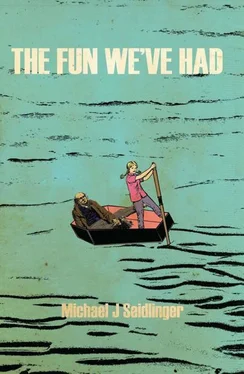And because it was her body that he borrowed, when he released the water back into the sea, vomiting it up effortlessly, she watched it once again unfold.
But for once he retorted and felt the sort of relief that is fleeting, the feeling of satisfaction that she had felt in the moment before this.
All the lines delivered and the mouthfuls of water gulped down, all of it laced in a fake sort of anger, a sort of resentment that only needed to be there so that she could identify that she might have gone too far. Ultimately, it was his humble move toward letting more of this go.
Letting the tale continue rather than derail.
Her resentment was truer now that it was, here and now, written to state that he, not she, was first to let go of the anger, admit the anger, and look for the pieces that could still be offered some sort of apology.
Here was his first, maybe, if she would take it plain.
But of course she wouldn’t, and she didn’t. She would take the coffin as far as one could plot a course through this sea, and given his efforts with the paddling, the unpredictability of life, it would not be very far.
[…] See that? The ellipses in brackets, bracketed together as an indication of omission, how their dialog, no matter how organic and honest, will always fall flat, always involve saying while what they felt, what they might be feeling at least distantly, becomes erased by each additional word.
This is how she felt as it crept on her too.
The anger subsiding.
He fought back.
Typical and it was typical of her to respond to his actions with sarcasm, with dry and dead jealousy. There was no just cause for jealousy. But indeed there it was.
And there it led her, right into those blue eyes, the kind of blue that every film and every summertime television show duped people into believing the sea could be that perfect.
Into the blue, she saw what only she could see in herself: the pride of a young preteen, inflated beyond managing, the sort of thing that might involve mixing in the word “perfection” among every line having to do with her looks.
Voiceless she let that borrowed body of hers sink.
As he drank the water that she let into the coffin, she sank deeper into the color blue as it painfully made it clear that what she had fought was what she couldn’t bear to see.
[…]
[…]
[…]
[…]
[…]
[…]
[…]
[…]
[…]
[…]
[…]
If there would be any blame, how about blaming the pride, the poor image-development, how the smile that still managed to be cast across his face even though he couldn’t be smiling, was the result of endless sessions at the mirror, her ceaselessly practicing each flattering gesture, examining each inch of her face and body for wrinkles, problems, something fixable.
Additional blame being that she brought in the water, like she might have brought them here. She brought him closer to danger. She used everything that was available to use, and she was the type to take advantage, to become bitter when things weren’t skewed her way… and the fact is she still is all of these things, despite all that she can no longer be.
She made him drink all that water, but it was her body that took it all in. Fault, and, by far, the word would be transformed into the basis of what she saw. Fault. Hers.
Nowhere near perfect. Frankly what she saw, her tongue scraping against the floor of the coffin, was pathetic.
She could think of herself as nothing more than that.
Well now. Are you well? You don’t look well. You might be sick. You might need help. I can help you. You can’t do this all by yourself. I can help. I want to help you. I will care double to make up for your carelessness.
Words to live by. They were words from a dialogue hushed by the inability to tell her any of it. Instead he had told her, “This argument of ours is proof that we have made progress!”
Even if they had, it looked like both him and her kept as far away from each other as they possibly could. They pushed away instead of pulling closer. There was a great lingering, a dauntless display of what they simply could not do. He lingered to one side while taking quick, jittery glances in her direction.
For all he knew, she did the same.
He could still taste the vomit in his mouth.
Bright sunny day bore into their borrowed bodies, enough that they couldn’t keep it up for long. He looked and then looked away. She looked and waited until he looked again. Eyes met; there was no affection, only a deep longing, a lingering that felt like an apology.
He was first. He would always be the one that started and she would always be the one that stopped.
He walked over, found a spot near her, and looked into those tired eyes. Unable to take it for much longer than a glance, he knelt down near the side of the coffin and looked into the water.
His reflection was her reflection. Breathlessly, he imagined exhaling relief. He had missed seeing her. Every time he looked at her, he had to look beyond her. But not when he looked into the water. Looking into the water, he could really see her, and then there was talk. He had wanted to talk.
Talking let him hear her voice.
“Now how is that not the exact same thing as demise?”
What would he say to that?
“His heart is now stone.” Felt where her heart would be and having failed to find it, he understood that it was his heart that he was looking for. It was his heart that he couldn’t find.
“I have a number of ideas.”
“Help is help and I am here to help.” Help wanted.
He liked hearing the sound of her voice.
“I worry about you.”
The way her voice almost sounded certain and caring when he spoke. He needed to hear it again. “Why do you care?”
It sounded like she still cared. Cared about him, cared that they could be so close and yet so distanced from each other. He heard only the tone and inflection of each line, lived by the way each sounded, evidently aware that she should never have been made to say these things.
“How long are you going to hold your breath?”
“I’ve never been this close.”
“You are already dead as far as I’m concerned.” It was then, with his arms crossed, hands hiding in the curve of each arm, that he understood what he had borrowed. A moment of worry replaced with a moment of grace. Again and again he will hesitate and he will suffer from a distant and old, a tireless worry. The hesitation will appear to her as a lacking, a gesture of doubt, of jealousy, the narrow yet wide range of deceit, again and again, because he couldn’t just reach for her hand. He couldn’t just tell her what he now knew. Reaching for her hand, he’d only grasp air. To touch her hand, he would later learn to bring both of the borrowed body’s hands together, clasped in mock prayer. Maybe he’d pray, pretending that she could feel this too. For now, he plunged one hand into hers, his body, and seeing what he had done, she plunged her hand into his, her body. The perfect moment to say something. Say that he had done it to save her. Say that he had done it because it was how he could remain close to her. Say whatever can be said. It would make no difference.
This was all talk of the mind.
This is a line written to fill in for what she could not express. This is another line written for all the lines she will never be able to say, much less explain. And this line represents the halves that she’ll never identify. Every other line is written using the half that still remains, the half that keeps glancing at her when she isn’t looking. It’s the only half of her that’s left, and it’s the part of her that she does not want to see. The rest became part of the telling.
Читать дальше












